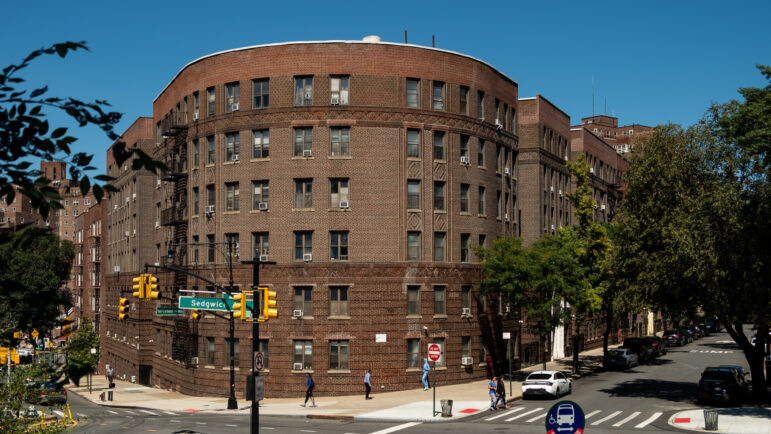The U.S. Supreme Court on Monday said it will not consider a challenge to rent stabilization from major landlord groups in New York, prompting a sigh of relief among tenants even as they await clarity on two other similar cases still pending.

Adi Talwar
A rent-stabilized building on Gouverneur Avenue in the Bronx. New York’s Rent Stabilization Law applies to buildings constructed before 1974 with more than six units, as well as newer properties with state tax breaks.The U.S. Supreme Court on Monday said it will not consider a challenge to rent stabilization from major landlord groups in New York, prompting a sigh of relief among tenants even as they await clarity on two other similar cases still pending.
As is common, the justices did not explain their reasoning in tossing the lawsuit from the Community Housing Improvement Program (CHIP) and Rent Stabilization Association (RSA), simply stating that they had denied the parties’ petition.
CHIP and RSA had argued that New York’s Rent Stabilization Law (RSL) amounts to an unconstitutional taking of private property.
“It’s definitely positive news that CHIP was denied and we hope that the same will happen in the other two cases,” said Ed Josephson of the Legal Aid Society, co-counsel for tenant groups who joined all of the pending rent stabilization lawsuits.
“I think I’m optimistic that the other petitions will be denied because all of them are contrary to long standing precedent,” he added.
Passed by the New York City Council in 1969, the RSL set the groundwork for rent stabilization at a time when housing costs were rising dramatically. Enforced at the state level through the Rent Stabilization Code, the protections apply to buildings constructed before 1974 with more than six units, as well as newer properties with state tax breaks.
Under rent stabilization, tenants across nearly 1 million apartments in New York City benefit from lease renewal rights, and limited annual rent adjustments.
In June of 2019, tenants celebrated the passage of the Housing Stability and Tenant Protection Act (HSTPA), which, among other things, removed landlords’ ability to increase the rent on vacant stabilized apartments by 20 percent.
Lawsuits were quick to follow—five in total, of varying scope, brought against the city and state by landlords and trade groups.
Two groups of landlords, led by 74 Pinehurst LLC and 335-7 LLC, are still awaiting news on their own requests—called petitions for a writ of certiorari, or cert petitions—now that the CHIP and RSA petition has been denied. Neither could immediately be reached for comment.
Thomas Silverstein, of the Fair Housing and Community Development Project at the Lawyers’ Committee for Civil Rights Under Law, noted a key difference between the still-pending cases and CHIP and RSA’s lawsuit.
CHIP and RSA had brought a purely facial challenge to the RSL, meaning that, in order to prevail, the plaintiffs would have to show that the law could not be constitutional under any circumstances.
Whereas the other two lawsuits include facial and “as-applied” challenges, meaning they allege the RSL is unconstitutional as it is applied to their specific circumstances.
“I think we’re in a position where we still have to monitor and see what the court does,” Silverstein said. “It’s possible one or both of the other cases will be re-listed, which would mean that the justices would discuss the cases again at an upcoming conference.”
“It’s also possible that they won’t be re-listed but there will be more orders based on the past conference on a subsequent order date,” he added.
The public could learn the fate of Pinehurst and 335-7 LLC early this month.
“It’s really hard to predict the sort of nuances of what a decision could look like if one of those cases is taken and if the Supreme Court decides it in a way that’s adverse to the city and the state, but I think the devil is in the details,” Silverstein said. “There’s a risk of a decision that could be as sweeping as a facial challenge and the possibility of much more narrow decisions.”
In a statement, CHIP and RSA said the denial of their petition is a “signal to bring more targeted challenges to specific provisions of the law.”
“Let’s be clear. The Supreme Court’s actions today do not certify New York’s Rent Stabilization Law is constitutional,” the groups said. “We knew that bringing facial challenges to the law was an uphill battle, but that was also the quickest and most efficient way to provide the broadest relief for all property owners suffering from unconstitutional restrictions under this law.”
“This is not the end of the road,” the organizations said.
Cea Weaver, organizing director for the statewide tenant coalition Housing Justice for All, said Monday that she is feeling optimistic, but cautious.
“We’re optimistic but we need all three of these cases to not be granted cert, so we are still waiting, honestly,” she said. “I don’t think we are fully out of the woods here, but we of course think this law is constitutional.”
To reach the editor behind this story, contact Jeanmarie@citylimits.flywheelstaging.com. To reach the reporter, contact emma@citylimits.flywheelstaging.com.








